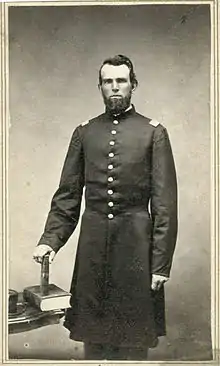Clement Warner
Colonel Clement Edson Warner (February 23, 1836 – May 20, 1916) was a Wisconsin farmer and officer in the American Civil War. He served two years (1867–1868) as a Unionist member of the Wisconsin State Senate and one (1883) as a Republican member of the Wisconsin State Assembly from Dane County.

Background and war experience
Warner was born in Batavia, New York on February 23, 1836; received a public school education; and became a farmer. He came to Wisconsin in 1852 and settled at Windsor, Wisconsin.
In 1857 he enrolled in classes at the University of Wisconsin.[1] During the American Civil War he assisted in raising a company for the 36th Wisconsin Volunteer Infantry Regiment, and was mustered in as captain in March, 1864. They joined the Army of the Potomac in May. Within one hundred days the regiment was nearly annihilated in battles around Richmond and Petersburg, during which time Warner received commissions to major, lieutenant-colonel and full colonel. He lost an arm on August 14, 1864, while in command of the regiment at the Second Battle of Deep Bottom.[2] He returned to his regiment in November and commanded it until the close of the war.
His regiment participated in the Richmond-Petersburg Campaign in 1864 and 1865. He was in the final charge April 2 at Petersburg and present at the surrender of Robert E. Lee at Appomattox Court House April 9, 1865.[2] He was mustered out July 12, 1865.
Public office
Warner was elected to the Senate as a Unionist in 1867 (succeeding fellow Unionist Willard Chandler) and as a Republican in 1868. He was succeeded by Republican Nelson Williams.
In 1873, he ran for the Assembly's 2nd Dane County district, which at that time consisted of the Towns of Blooming Grove, Burke, Dunn and Windsor, and the City of Madison) to succeed fellow Republican Levi Baker Vilas, who was not a candidate for re-election. He lost with 995 votes, to 1,388 for merchant Philo Dunning, the candidate of the Reform Party (a short-lived coalition of Democrats, reform and Liberal Republicans, and Grangers.
In 1877 he became Superintendent of the Poor for Dane County. In 1883 he was elected to the revised second Dane County Assembly district (Bristol, Burke, Cottage Grove, Deerfield, Medina, Sun Prairie, Vienna, Windsor and York) to succeed fellow Republican Elisha Keyes for 1883, receiving 980 votes against 945 for Democrat A. L. Durfey and 1 for Prohibitionist J. F. Taylor.[3] He was not a candidate for re-election in 1884, and was succeeded by Republican Charles Buell. He died at his home in Windsor.[2]
Family
He married Eliza Noble (1842–1916) in 1867.[4] Their son Ernest Noble Warner represented Madison in the Wisconsin State Assembly; his granddaughter's husband, Fred Risser, served in the State Senate; and his great-grandson Fred A. Risser represented Madison in both the Assembly and the State Senate.
Further reading
- Warner, Clement Edson; Elizabeth Marshall Warner, Judith Mayer Risser, eds. The letters of Colonel Clement Edson Warner, while serving in the Thirty-Sixth Wisconsin Volunteer Infantry Regiment during the American Civil War, 1864–1865: with quotations from the military history of Wisconsin, by E.B. Quiner, 1866: family history, other letters, and memorabilia relating to colonel Warner and family. Milwaukee, 2004.
References
- Lathrop, John H., et al. "Document G: Ninth Annual Report of Regents of University of Wisconsin for 1856"; p. 50; in Governor's Message and Accompanying Documents for the Year 1857 Vol. I 1857 [Covers 1856]
- "Veteran of Civil War Dies". The Oshkosh Northwestern. Oshkosh, WI. May 22, 1916. p. 1. Retrieved January 9, 2021 – via Newspapers.com.

- Heg, J. E., ed. The Blue Book of the State of Wisconsin 1883 Madison: 1883; pp. 487-8
- "Wife of Col. C. E. Warner Is Dead". Wisconsin State Journal. Oshkosh, WI. March 30, 1916. p. 8. Retrieved January 10, 2021 – via Newspapers.com.
